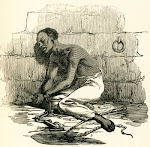
This is Black History Month. It was once known as Negro History Week. Rather than highlight Martin Luther King Jr, and other civil rights leaders this year, I thought I'd take a closer look at the founder of this national observance, Carter G. Woodson.
I have Woodson to thank for all those stern black faces on posters that once a year, during Negro History Week, looked down upon me disapprovingly, as I walked the halls of my high school.
How would I ever live up to the fierce demands that those inquiring eyes imposed upon me, a mere lad of the south?
Perhaps this was why Woodson founded Negro History Week: to sear into the black consciousness a challenge that asked: "How will you use your life to continue the work that these civil-rights stalwarts and pioneers began and you inherited?"
For his part, Woodson is rarely mentioned in the context of black history, nor is he given proper credit for his contribution to Black History Month. This year I wanted to make up for this oversight. You'd think that the person responsible for Black History Month would, at the very least, receive some "love", too, during this time of the year.
In the spirit of doing my part to restore Woodson to his rightful place in black history, and as the "Father of Black History," and the founder of what is now Black History Month, let me offer this background information--a brief summary of his life as a gifted scholar, and educator, and as an unlikely activist:
Carter Godwin Woodson founded The Journal of Negro History in 1916 and began Negro History Week (later Black History Month) in 1926, earning him the nickname "The Father of Black History." The son of enslaved African Americans, Carter Woodson earned undergraduate degrees at Kentucky's Berea College in 1903 and at the University of Chicago in 1907. He also studied at the Sorbonne in Paris, and after he earned a graduate degree at Chicago (1908), he went on the earn his doctorate in History from Harvard University in 1912.
Woodson taught in public schools in Washington, D.C. and served as a dean at both Howard University and the West Virginia Collegiate Institute. But his greatest impact was as the leader of the Association for the Study of Negro Life and History, an organization he founded in Chicago in 1915. (The name was changed to the Association for the Study of African American Life and History -- ASALH -- in 1972.) Woodson and his colleagues were energetic advocates for the study of black history as its own field, and they spread the word through their Journal, as well as through articles in Marcus Garvey's Negro World, public lectures and an ambitious community outreach program that welcomed students and non-academics. He also used the study of history as a spark for social activism, as evidenced in his most famous book, The Mis-Education of the Negro (1933).
Carter Woodson began Negro History Week in 1926, designating a week in February, because that month held birthdays for Abraham Lincoln, Frederick Douglass and Booker T. Washington. That went on to become Negro History Month and then Black History Month, designated as February each year by presidential proclamation. Carter G. Woodson's other books include A Century of Negro Migration (1918), A History of the Negro Church and The Negro in Our History (1922).
Carter G. Woodson was the second African American to earn a Ph.D. at Harvard -- the first was W.E.B. DuBois... Woodson served as an education administrator in the Philippines from 1904 to 1907... He launched the publication The Negro Bulletin in 1937 as a way to reach younger audiences... President Gerald Ford began the tradition of declaring February to be Black History Month in 1976.







4 comments:
Sometimes I wonder about how black men like Carter Woodson were able to deal as they did. A guy like this was clearly highly intelligent, but locked out by a society due to the color line. How frustrating that must have been for him.
I didn't know he was a Harvard graduate. I must do some further reading on him for background. I've not had a chance to read his classic, The Mis-education of the Negro. I think for black history month, I'll pick it up, read it and do a book review.
@Greg L: "How frustrating that must have been for him."
There were many like Woodson, similarly situated. Life didn't offer them many choices for intellectual and creative growth within the country of their birth, so I'm not surprised that the likes of W.E.B. Dubois, and Josephine Baker, left this country and obtained citizenship elsewhere.
The color line may have frustrated the aspirations of many blacks, but it also hamstrung a nation, such as ours, now struggling to maintain and retain preeminence among a community of nations.
What did this nation gain by holding blacks down, and back, and allowing whites to soar unfettered?
The energy that was used to suppress blacks, and the energy that was used to fight it, could have been better used to "promote the general Welfare" of the nation, truly making us a force to be reckoned with among the nations of the world.
Your book reviews are a thing of beauty. I look forward to the next one.
"He also used the study of history as a spark for social activism..."
This is one of the, if not the most important things to take away from Black History Month; by studying the struggle for equal rights and opportunity we can find many lessons for strategies in the here and now. The more you read and learn about the diaspora the more you see the same patterns emerging in space and time.
I believe we are now witnessing a regression and erosion of equality that must be addressed by mass mobilization, similar to the great struggles of the past.
"I believe we are now witnessing a regression and erosion of equality that must be addressed by mass mobilization, similar to the great struggles of the past."
Rush Limbaugh says that Republicans should "go all Egypt," or some such language, against liberal policies.
Perhaps we should "go all Egypt" against him, John Boehner, and the entire Republican party for its recent attacks against the US Constitution, hoping to change certain provisions to deny citizenship for the children of undocumented immigrants born here, and seeking to redefine rape.
The people's rights are under assault. It may take mass demonstrations to get a hearing, and then a cease and desist order.
Post a Comment